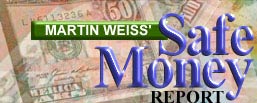NEWS AND COMMENTARY
December 19, 2000 
Fed to Focus on Controlling Slowdown
By Richard W. Stevenson, The New York Times
Hard Landing Already Underway ... Weiss comments
WASHINGTON - More than a decade after the start of the last recession, the Federal Reserve will meet on Tuesday to debate how to keep the current slowdown from deteriorating into a downturn.
Though it has come more abruptly than almost anyone anticipated, the slowdown is exactly what the Fed was trying to accomplish by raising its benchmark interest rate by 1.75 percentage points in six steps between June 1999 and May 2000.
With the economy having decelerated, apparently to a rate well below what most economists consider to be the point at which it tends to generate inflation pressures, the Fed is all but certain to state after the meeting that it no longer sees inflation as being the primary threat.
But fine-tuning the economy is a tricky business. History suggests that it is difficult to keep a slowdown from gathering momentum, especially if confidence among investors and consumers begins to crumble.
There is also the possibility that factors like high energy prices and low unemployment could set off an inflationary spiral in prices and wages even as overall economic growth slows. That combination would put the Fed in an excruciating position.

"Those who argue that we are already in a recession are reasonably certain to be wrong."-- Alan Greenspan, August 1990.
In August 1990, the U.S. economy had been in recession for a month. Alan Greenspan has been wrong before, and he will be wrong again if the Fed decides to take any action on interest rates at today's meeting.
The economy is in the midst of an economic slowdown. And, it is headed toward a recession. But an interest rate cut would only ignite already smoldering inflationary pressures. Low unemployment has already caused an up-tick in wages. And high energy prices have certainly begun to have an influence on overall prices. Plus, if the Fed reignites investor and consumer confidence, it will be much easier for manufacturers and producers to raise prices on goods. Any interest rate decrease now will undoubtedly result in spiraling inflation.
To counter this, the Fed will then be forced to raise interest rates even higher. This is will trigger a vicious cycle of rate hikes and economic swings that will make the recession even worse.
Printer Friendly Version
|





